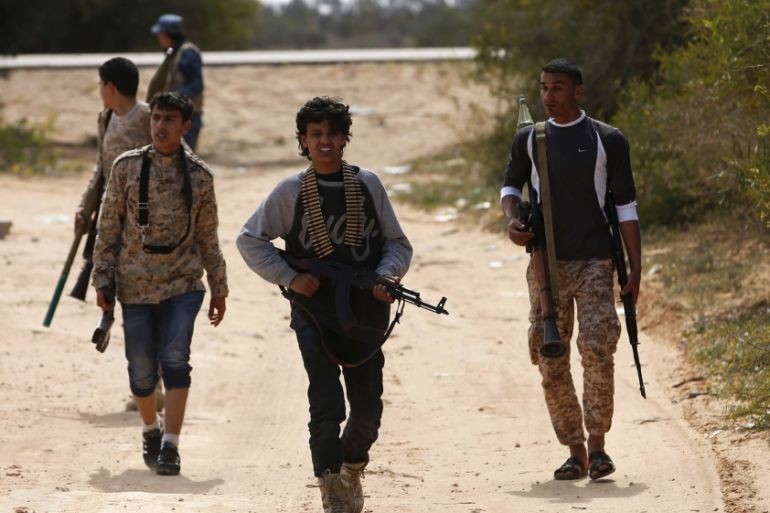What is not being discussed about Libya
Six governments and four years later, Morocco talks lack substance.

The UN Special Envoy to Libya, Bernardino Leon, has been trying to herd the scattered Libyan politicians of all political shades around the table in order to negotiate a peace treaty of sorts, put an end to the fighting, and establish a unity government that can keep the country together and enable it to serve as a credible member of the international community and a trustworthy recipient of international assistance.
He began several months ago with an initial round of talks between the old expired General National Congress (GNC) in Tripoli and the newly elected, albeit legally and electorally controversial, House of Representatives (HoR) in Tobruk.
Keep reading
list of 4 itemsCIA chief visits Libya after Lockerbie suspect handover
Libya: Violence to Votes
In Libya, anger and uncertainty after polls delayed
The discussions were later moved to Geneva with an expanded list of participants representing larger set of groups and antagonists, including representatives of local municipalities. A little over a week ago, the discussion in Morocco finally revolved around the central question of a unity government. Participants then went home to discuss the proposal with their respective political groups, and returned to Morocco at the end of last week to finalise an agreement. This plan was not realised, as the HoR asked for a delay until the end of this week.
Bizarre Libyan stage
In the meantime, Leon, in partnership with the Algerian government, held a round of discussions with various hand-selected representatives of the one-man-shows parading around the bizarre Libyan stage as civil society organisations and political parties. Most of these do not, in fact, represent anyone other than themselves and do not have seats in the HoR or the GNC, or even in local governments.
![Bernardino Leon poses with Libyan political leaders and activists in Algiers [AFP] [AFP]](/wp-content/uploads/2015/03/540cbb396926472f8e9180f119341d5a_19.jpeg)
But don’t despair. Many other groups and forces are also not represented and have not been consulted in the UN-sponsored Libya dialogue; in fact, the majority of Libyans are not involved in this process in any way.
All eyes are now focused on this week’s supposed official rounds in Morocco, scheduled to take place this Thursday, and whether or not they will be able to produce a framework for a unity government and decide who should head it.
The problem, of course, is that we have all been there before with, depending on how they are counted, as many as six temporary and transitional prime ministers and governments since 2011 – one of which was elected but did not take office after the government line-up of Mustafa Abushagour was rejected in 2013 by a strange alliance (National Forces Alliance) between the Muslim Brotherhood and their enemies.
Another cabinet, headed by Ahmed Metaig, was legally challenged by foes before an obscure and toothless supreme court that was brought to life for that purpose, much to the surprise of many Libyans who had never heard before that they actually had a supreme court.
The problem has always been, not so much forming a government, but rather the ability of any government thus far to actually rule and exercise power and a monopoly on the use of force in the country.
As everyone on the planet has already heard, multiple Libyan governments in the past four years had their offices sacked; ministers faced militias with guns in their offices and signed all kinds of decrees in order to save their own skins; and a sitting prime minister was kidnapped from his five-star hotel room and then complained publicly that even his underwear had been stolen in the process.
Mercy of armed militias
Thus far, Libyan governments have been living under the mercy of armed militias and criminal gangs; with no real regular army to speak of, Libyans jokingly say, “The Libyan Army is the 10th strongest army in Libya.”
|
|
In this circus, no one is holding their breath in the hope that the Thursday meeting in Morocco will actually produce anything more than something that the UN can claim as a “success in the long process of international diplomatic efforts” before the camera.
This pessimism is due in large part to two key missing ingredients in the process. The first is the lack of a complete package, a new road map, and a hard restart of the entire Libyan transition, after four years of total failures, that will ensure that any new government can count on international assistance and perhaps even a military force to protect its members and secure the urban centres of Libya, including the capital, Tripoli, Benghazi, Misrata and Sabha.
The second reason has to do with those who have been excluded from the entire Libya transition and UN process, namely, the estimated 2 million exiles scattered between Egypt, Tunisia, the UAE, Jordan, and Turkey, most of whom are former allies and officials of the late Muammar Gaddafi
Thus, we are left to wonder how excluding 25 percent of the population will help rebuild Libya, given all that we have learned from the ongoing saga in Iraq.
Hafed al-Ghwell is a senior non-resident Fellow with the Rafik Hariri Center at the Atlantic Council in Washington DC and former adviser to the Dean of the Board of Executive Directors of the World Bank Group.
The views expressed in this article are the author’s own and do not necessarily reflect Al Jazeera’s editorial policy.
